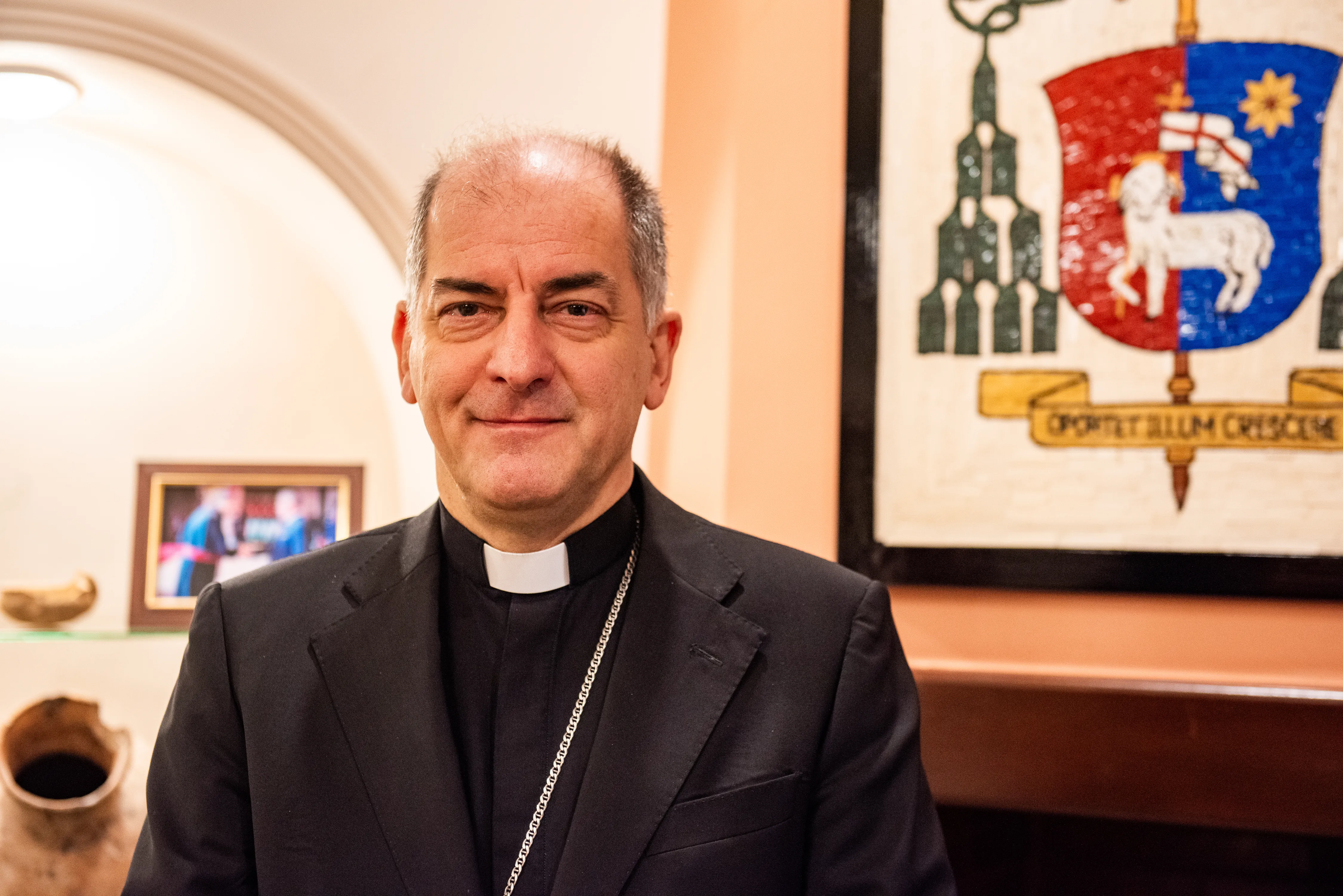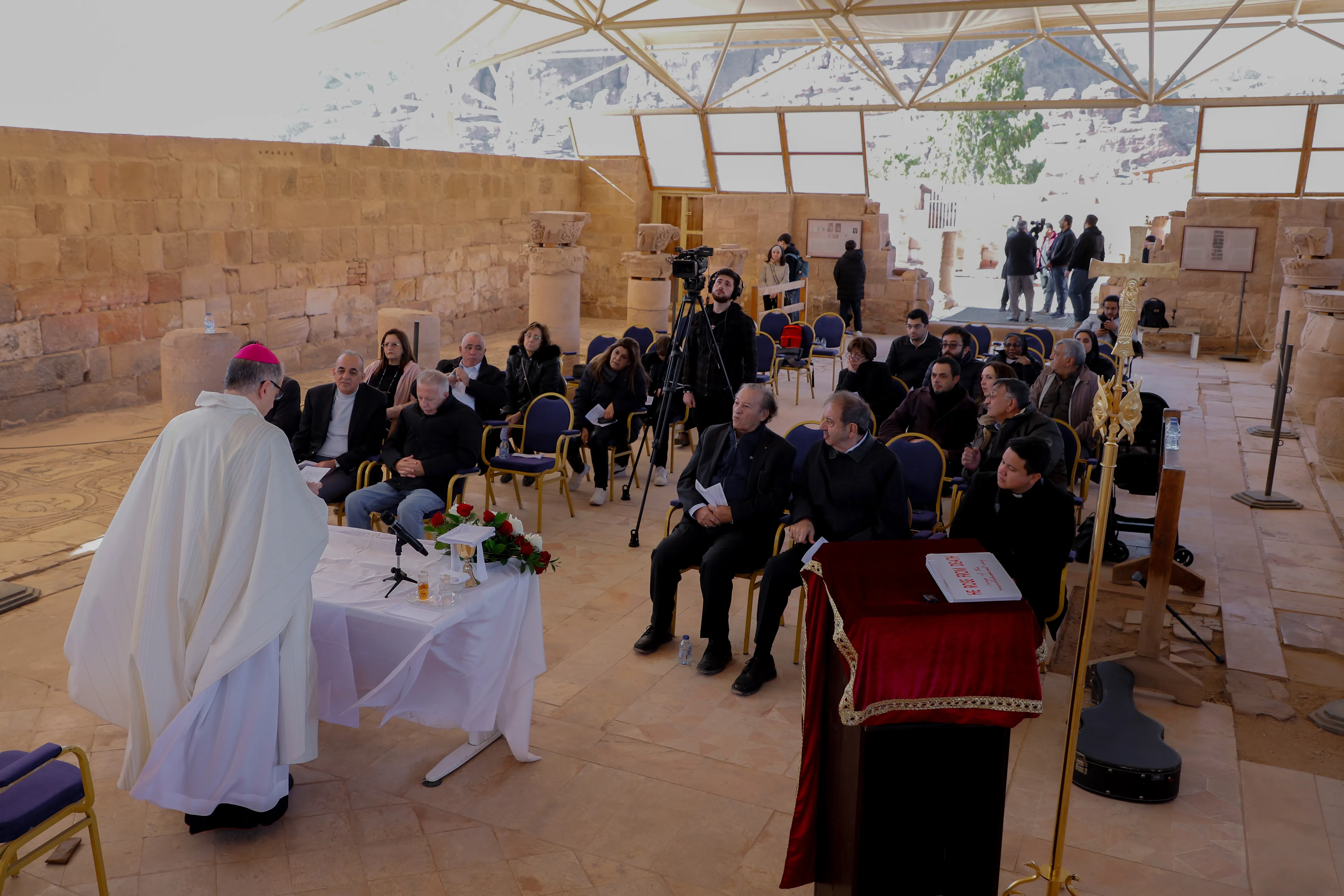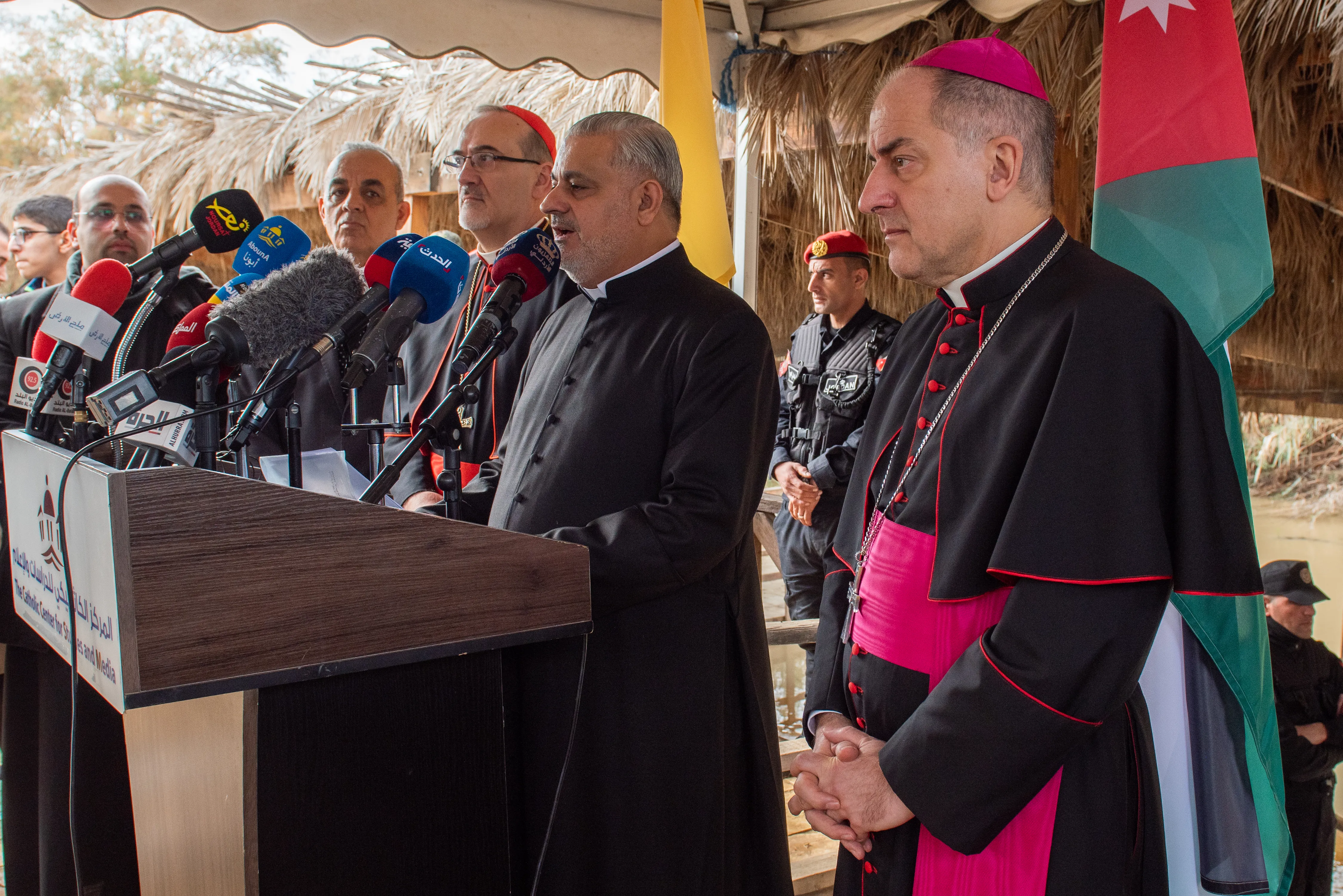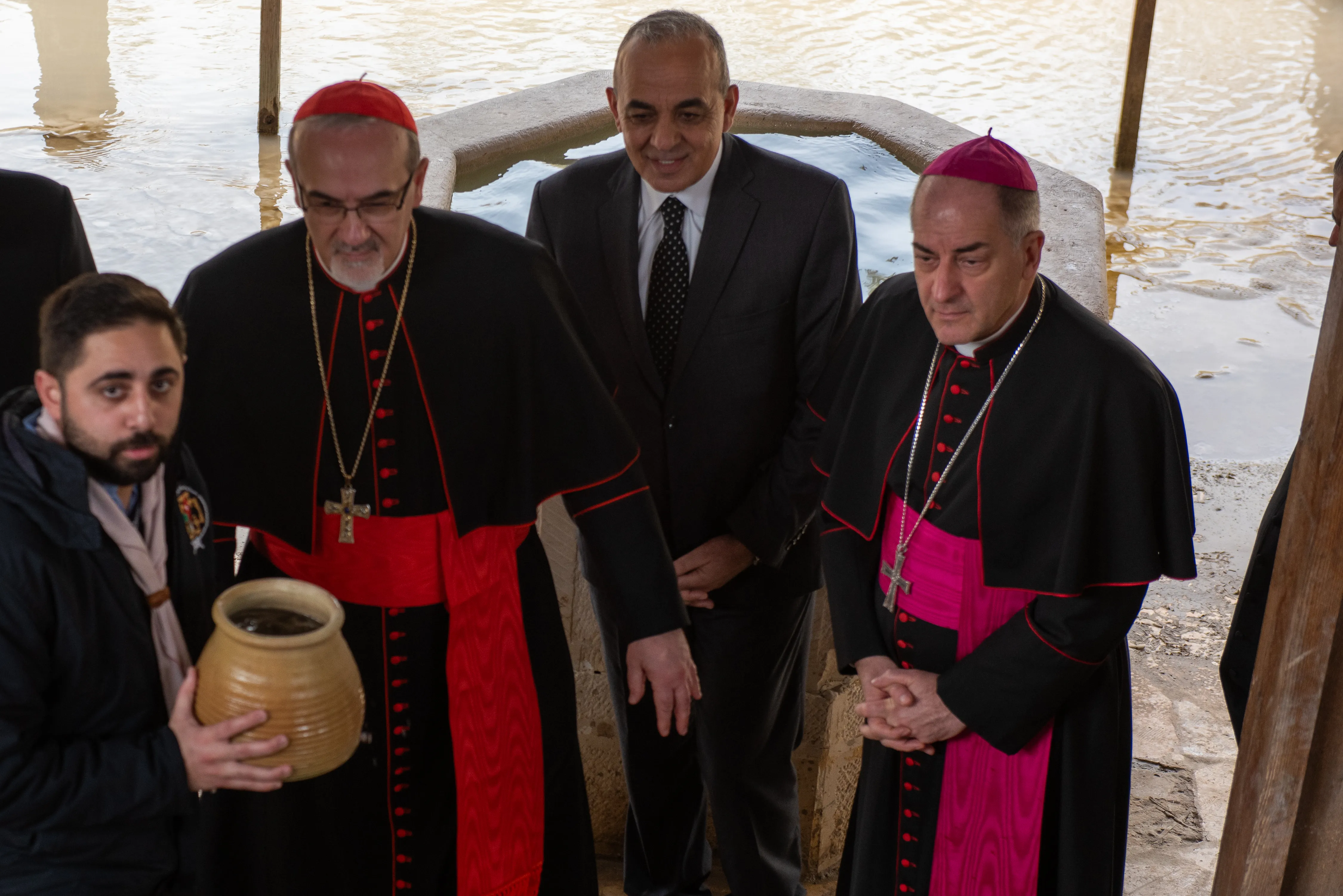
Amman, Jordan, Jan 21, 2024 / 07:00 am (CNA).
A year ago, on Jan. 21, 2023, Bishop Giovanni Pietro Dal Toso became the first resident nuncio to Jordan. Before that, the Apostolic Nunciature of Jordan was joined with that of Iraq.
Recently, CNA had the opportunity to meet with the nuncio to Jordan at his residence in Amman, a unique place from which to observe the events currently shaking the region.

“The conflict is not in Jordan, but we experience its reflections and consequences here,” Dal Toso said. “There is both a geographic and emotional closeness: a significant number of Palestinians have settled in Jordan in various waves — first in 1948, then in 1967. … Many Palestinians living here have relatives on the other side of the border.”
It is estimated that out of its 11.3 million inhabitants, there are 2.2 million Palestinian refugees in Jordan, and 3 million when considering Jordanians of Palestinian descent, including Queen Rania. After all, until 1967, there were no borders between Amman and Jerusalem, and even today many Palestinians hold Jordanian passports.
The ongoing conflict in Gaza has repercussions not only at the political level, with significant domestic pressures on the Hashemite Kingdom of Jordan, one of the key allies of the United States in the region, but also economically, Dal Toso said: “The economic relations between Israel and Jordan were quite intense. This conflict has held back trade a lot.”
Some studies suggest that, from an economic perspective, the consequences of the conflict on Lebanon, Jordan, and Egypt will be substantial. Socially, “there have been no specific unrest, but there is a widespread feeling of discomfort, which, for example, from the ecclesial point of view has been expressed in the fact that Christmas celebrations this year were more subdued,” he said.

There are no accurate statistics on the number of Christians in Jordan. According to the latest report from Open Doors in 2023, the Christian population is estimated to be approximately 170,000 people, belonging to various rites and denominations.
The numbers released by the Vatican at the time of Pope Francis’ visit to Jordan in 2014 reported 107,000 Catholics. Among these, there is undoubtedly a high percentage of migrants.
The apostolic nuncio spoke of the impact of the Jordanian Church, which belongs to the Latin Patriarchate of Jerusalem.
“I found a Church not very consistent in terms of numbers, but very active,” he said. “The Christian community contributes significantly to the growth of society. Moreover, it is a Church rich in vocations: Most of the priests of the patriarchate come from Jordan, as do the majority of the faithful.”

This is Dal Toso’s first experience as a nuncio after holding various positions in the Vatican, primarily related to evangelization.
“Encountering this world, which I knew only marginally, has prompted me to reconsider many issues, particularly the relationship with the Muslim world. Here, among Christians and Muslims, it is much more than coexistence; it is a genuine familiarity. This is highly significant because it may indicate a path beyond this country,” he said.
In the reception room of the nunciature, there is a photo of Dal Toso with King Abdallah II.
“The Jordanian government pays close attention to the Holy See and is interested in the Christian presence in this country because it recognizes that the Church and the Holy See pursue the same goals of coexistence, pacification, and human dignity that Jordan also seeks to promote,” Dal Toso told CNA.
For the Holy See, Jordan is an important and reliable intermediary and a key actor in promoting peaceful coexistence throughout the region, he said.
As the representative of the Holy See in Jordan, Dal Toso maintains direct and frequent contact with representatives of the Hashemite Kingdom, which has increased with the outbreak of the war in Gaza.
“Since the beginning, the pope and the Holy See have consistently advocated for a clear stance: a cease-fire, the release of prisoners, respect for international law, and humanitarian assistance. All this is within the perspective of two states with Jerusalem having a special status guaranteed by the international community,” Dal Toso said.
This position has resonated with the Jordanian royal house and government, according to the nuncio. “Jordan’s position has always been very balanced, seeking a peaceful solution in line with U.N. resolutions that envision the creation of two states,” he said, emphasizing that “it is time to stop this war” and “begin serious negotiations. It requires people of goodwill willing to seek paths of peace and move beyond mere proclamations.”
Jordan occupies a geographically sensitive position, serving as a buffer between Israel and the Arab states. Hence the importance of political stability in the country and the need for intense diplomatic activity. During these months of conflict in Gaza, Jordan is emerging as a sort of “hub” for humanitarian aid.
“Jordan has significantly intensified humanitarian activities, with two field hospitals in Gaza. Many of the humanitarian aid shipments to Gaza have originated from Jordan, and I believe this will also open up important prospects for the future,” Dal Toso said. “Our Catholic charitable organizations have also become part of this extensive humanitarian aid effort.”
It was from Jordan, on the eve of Christmas, that some humanitarian aid reached the Latin parish in Gaza.
As for its more routine activities, the nunciature in Jordan is highly active in the field of religious tourism. In the second week of January, a delegation from the Jordanian Ministry of Tourism was received at the Vatican, with the aim of increasing attention to Christian sites in Jordan.
The apostolic nuncio himself celebrated the Epiphany Mass in Petra, the Nabatean city that has become Jordan’s major tourist destination, at the invitation of the government and the site’s director. According to the latest theories, it is believed that the Magi passed through here on their way to Bethlehem.
“Jordan is also holy land. Jesus was here — at the site of the baptism,” the nuncio said. “In Jordan, we have important holy places for Christians, such as Mount Nebo or Machaerus. Not everyone knows that there are at least 10 certified Byzantine Christian churches in Petra! It was a place with a strong Christian presence in the early centuries.”

The Holy See wants to enhance pilgrimage routes in Jordan. “There is a common interest,” Dal Toso said. “There is an economic aspect, but also a significant spiritual aspect. It is good for Christians to come here: Pilgrimage is not only functional for the visit but also for the renewal of one’s faith.”
The timing is ideal with the jubilee of 2025 approaching. Furthermore, the nuncio said, “Jordan remains a safe country for tourists and pilgrims.”
Dal Toso also emphasized that “the encounter between people” is important to remember.
“It is the encounter that breaks down barriers,” he said. “When people from the West meet people from the East, when Western churches meet Eastern churches, when Christians meet Muslims, these personal encounters help create a culture of dialogue, of encounter, a different coexistence marked not by conflict but by the recognition of common humanity.”
If you value the news and views Catholic World Report provides, please consider donating to support our efforts. Your contribution will help us continue to make CWR available to all readers worldwide for free, without a subscription. Thank you for your generosity!
Click here for more information on donating to CWR. Click here to sign up for our newsletter.




Leave a Reply